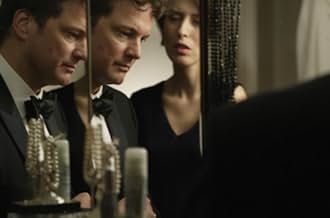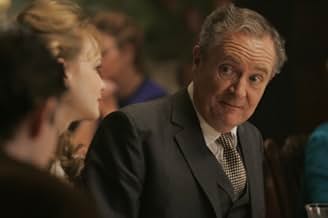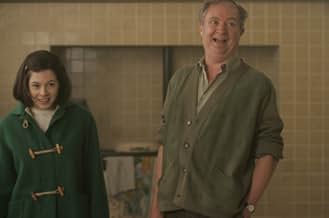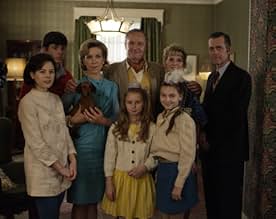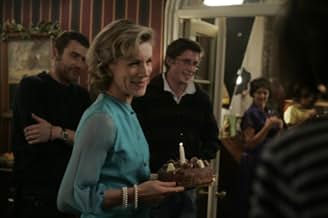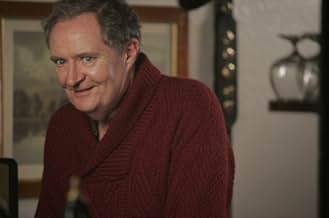VALUTAZIONE IMDb
6,8/10
4777
LA TUA VALUTAZIONE
Aggiungi una trama nella tua linguaThe story of a son's conflicting memories of his dying father.The story of a son's conflicting memories of his dying father.The story of a son's conflicting memories of his dying father.
- Regia
- Sceneggiatura
- Star
- Premi
- 1 vittoria e 12 candidature totali
Recensioni in evidenza
"And When Did You Last See Your Father?" (2007) is an English film directed by Anand Tucker. It reminded me of the U.S. film, "The Savages," because the central plot of both movies involves a dying father who has not lived an exemplary life. Jim Broadbent is superb as Arthur, an obviously wealthy man who nevertheless goes through life cheating and manipulating people in small ways. He has a bluff, hearty, hail-fellow-well-met personality that charms people who meet him for the first time. In reality, he bullies his son and cheats on his wife. (Juliet Stevenson is excellent in the supporting role of wife and mother, as is Matthew Beard who plays Blake as a teenager.)
Colin Firth is equally convincing as Arthur's son, Blake. He's a successful award-winning writer, who nonetheless sees himself as perpetually in his father's shadow. Both men must come to grips with the situation when Arthur develops terminal cancer.
Broadbent and Firth look like each other, so it's easy to accept them as father and son. The film unfolds in an intelligent and interesting fashion. It's both artistically satisfying and philosophically challenging. I think the movie has been underrated by IMDb viewers. It's low key and thoughtful, but that's what it's supposed to be. There's nothing about it that struck me as artificially artistic. It's an honest and effective film, and worth seeking out and seeing.
Colin Firth is equally convincing as Arthur's son, Blake. He's a successful award-winning writer, who nonetheless sees himself as perpetually in his father's shadow. Both men must come to grips with the situation when Arthur develops terminal cancer.
Broadbent and Firth look like each other, so it's easy to accept them as father and son. The film unfolds in an intelligent and interesting fashion. It's both artistically satisfying and philosophically challenging. I think the movie has been underrated by IMDb viewers. It's low key and thoughtful, but that's what it's supposed to be. There's nothing about it that struck me as artificially artistic. It's an honest and effective film, and worth seeking out and seeing.
I'm astonished by the miserable so-and-sos above who complain about the "overdone production" on this movie.
Anand Tucker and his crew have taken obvious pains to elevate a conventional story into a visual tone poem. Every shot shines with polish, care, and attention. If it said "A Ridley Scott Movie" at the beginning, the reviews would read "Scott brings his usual visual excellence to bear."
A terrific little movie, elevated out of its class, with nice performances (I especially enjoyed the underused Gina McKee, who is practically luminous in every scene).
Now, the rest of you get back to watching and praising the drab and visually tedious kitchen sink junk that the British film industry does "so" well...
Anand Tucker and his crew have taken obvious pains to elevate a conventional story into a visual tone poem. Every shot shines with polish, care, and attention. If it said "A Ridley Scott Movie" at the beginning, the reviews would read "Scott brings his usual visual excellence to bear."
A terrific little movie, elevated out of its class, with nice performances (I especially enjoyed the underused Gina McKee, who is practically luminous in every scene).
Now, the rest of you get back to watching and praising the drab and visually tedious kitchen sink junk that the British film industry does "so" well...
Blake Morrison's memories are served for public consumption in a respectful but slightly confused rendition. Jim Broadbent delight us, once more, with his overgrown child of a father that seems a figment of her son's imagination. His childishness seems to be his only flaw. I couldn't help but being reminded of Tim Burton's "Big Fish" this time, with radically different flights of fancy. Colin Firth plays the writer/son as a crashing bore. Was that on purpose? I've been longing to see Firth again in parts like the ones he so amazingly captured - "Apartment Zero" comes to mind. Here earnest or not earnest, loving, selfish and so forth I didn't quite get myself interested enough to care as much as I feel I should have. Matthew Beard, the younger Blake and Juliet Stevens as the mother, manage to create more intriguing characters. The film, however, belongs to Jim Broadbent - His character is a loving mix of assorted British loving eccentrics. The fact that this is the way her son Blakes remembers him, makes the experience worth while.
The writer Blake Morrison (Colin Firth) has a non-resolved relationship with his bragger and wolf father Arthur Morrison (Jim Broadbent). However, when he is diagnosed with a terminal intestine cancer, Blake leaves his wife and children and travel to the village where he spent his childhood and adolescence to help his mother and his sister to take care of Arthur along his last days. The location brings recollections of his problematic relationship with his father.
"And When Did You Last See Your Father?" is a sensitive movie about father and son problematic relationship. Through the recollections of Blake, the viewer understand the many unresolved situations that made him indifferent (or even hating) his flawed father that loved him indeed. In the end, it dawns on him that his father is gone and he will never see him again; and he grieves and regrets the lost moments he had along his life to stay with him. And you, when did you last see your father? My vote is six.
Title (Brazil): "Quando Você Viu Seu Pai Pela Última Vez?" ("When Did You Last See Your Father?")
"And When Did You Last See Your Father?" is a sensitive movie about father and son problematic relationship. Through the recollections of Blake, the viewer understand the many unresolved situations that made him indifferent (or even hating) his flawed father that loved him indeed. In the end, it dawns on him that his father is gone and he will never see him again; and he grieves and regrets the lost moments he had along his life to stay with him. And you, when did you last see your father? My vote is six.
Title (Brazil): "Quando Você Viu Seu Pai Pela Última Vez?" ("When Did You Last See Your Father?")
Reel Inspiration Review: When Did You Last See Your Father.
When Did You Last See Your Father ignores standard Hollywood wisdom: Keep the title short and catchy. Avoid flashbacks. The action should be external, not internal. Make films that appeal to teenage boys. And most of all, don't do stories about old, dying people.
In an article about what sells in Hollywood, an agent moans that she just can't read one more story about coping with aging, dying parents. The market was glutted with them. I couldn't help but think that this must be a very timely and heartfelt theme since it was popping up in so many scripts. Is it possible that there's an adult audience hungry for stories that help them deal with the hard issues in their lives?
When Did You Last See Your Father is based on Blake Morrison's heart wrenchingly honest autobiographical bestseller. It is the story of the forty year old writer's attempts to resolve his troubled relationship with his father as he deals with his immanent death. Collin Firth courageously portrays the estranged son's sometimes unlikable sentiments of resentment, frustration, confusion, and disappointment tinged with compassion for his fading father. Being home brings back memories of coming of age in his charismatic father's shadow and discovering some hard realities about the man. Thanks to Jim Broadbent's dynamic performance, we can see why the son was once proud of him - even though he never felt his father's approval. Blake goes on an internal journey where he finds that he has some of his father's weaknesses. He must decide what kind of man he is to become. At first, the film's lengthy title seems to accuse the grown son of neglecting his father. But by the end, we discover that the title actually asks, "When was the last time you really saw your father - without your own feelings of inadequacy and resentment getting in the picture? When was the last time you saw love?"
Movie Blessings! Jana Segal reelinspiration dot blogspot dot com
When Did You Last See Your Father ignores standard Hollywood wisdom: Keep the title short and catchy. Avoid flashbacks. The action should be external, not internal. Make films that appeal to teenage boys. And most of all, don't do stories about old, dying people.
In an article about what sells in Hollywood, an agent moans that she just can't read one more story about coping with aging, dying parents. The market was glutted with them. I couldn't help but think that this must be a very timely and heartfelt theme since it was popping up in so many scripts. Is it possible that there's an adult audience hungry for stories that help them deal with the hard issues in their lives?
When Did You Last See Your Father is based on Blake Morrison's heart wrenchingly honest autobiographical bestseller. It is the story of the forty year old writer's attempts to resolve his troubled relationship with his father as he deals with his immanent death. Collin Firth courageously portrays the estranged son's sometimes unlikable sentiments of resentment, frustration, confusion, and disappointment tinged with compassion for his fading father. Being home brings back memories of coming of age in his charismatic father's shadow and discovering some hard realities about the man. Thanks to Jim Broadbent's dynamic performance, we can see why the son was once proud of him - even though he never felt his father's approval. Blake goes on an internal journey where he finds that he has some of his father's weaknesses. He must decide what kind of man he is to become. At first, the film's lengthy title seems to accuse the grown son of neglecting his father. But by the end, we discover that the title actually asks, "When was the last time you really saw your father - without your own feelings of inadequacy and resentment getting in the picture? When was the last time you saw love?"
Movie Blessings! Jana Segal reelinspiration dot blogspot dot com
Lo sapevi?
- QuizMatthew Beard wore brown coloured contact lenses in order to look more like Colin Firth.
- ConnessioniFeatured in Starfilm (2017)
- Colonne sonoreCold Cold Feeling
Written by JM Robinson
Published by EMI Music Publishing Ltd
Performed by T-Bone Walker
Licensed courtesy of EMI Records Ltd
I più visti
Accedi per valutare e creare un elenco di titoli salvati per ottenere consigli personalizzati
- How long is When Did You Last See Your Father??Powered by Alexa
- Is this movie based on a book?
- What was going on in the controversial bathtub scene?
Dettagli
- Data di uscita
- Paesi di origine
- Siti ufficiali
- Lingua
- Celebre anche come
- When Did You Last See Your Father?
- Luoghi delle riprese
- Aziende produttrici
- Vedi altri crediti dell’azienda su IMDbPro
Botteghino
- Budget
- 8.000.000 USD (previsto)
- Lordo Stati Uniti e Canada
- 1.077.273 USD
- Fine settimana di apertura Stati Uniti e Canada
- 39.210 USD
- 8 giu 2008
- Lordo in tutto il mondo
- 2.752.471 USD
- Tempo di esecuzione1 ora 32 minuti
- Colore
- Mix di suoni
- Proporzioni
- 2.35 : 1
Contribuisci a questa pagina
Suggerisci una modifica o aggiungi i contenuti mancanti

Divario superiore
By what name was And When Did You Last See Your Father? (2007) officially released in Canada in English?
Rispondi






